The Ethernet Fieldbus.
�
EtherCAT - The Ethernet Fieldbus.
EtherCAT is:
- Faster
- Synchronization
- Industrial Ethernet
- Flexible
- Easier to configure
- Cost effective
- Easier to implement
- Well proven
- Open
- Conformance
- Safety
- Redundancy
- Versatile
• Ethernet…
– is state-of-the-art technology at controller level
– are standard components, driven by the office sector
• Fieldbus…
– is lower costs
– is performance
– is deterministic (real time) distributed control
• Advantages of the combination:
– Lower costs because the use of standard components
– Access to internet technology (e.g. webserver)
– Reduction of interfaces
– Real time communication with cycle times <100 µs
– Flexible topology, arbitrarily extendable
© EtherCAT is registered trademark and patented technology, licensed by Beckhoff Automation GmbH, Germany.
© EtherCAT Technology Group, 2009
2
�
EtherCAT - The Ethernet Fieldbus.
• EtherCAT is real time down to the I/O level
• No underlying sub-systems any more
• No delays in gateways
•
In- and outputs, sensors, actuators, drives, displays:
everything in one system!
EtherCAT is:
- Faster
- Synchronization
- Industrial Ethernet
- Flexible
- Easier to configure
- Cost effective
- Easier to implement
- Well proven
- Open
- Conformance
- Safety
- Redundancy
- Versatile
© EtherCAT Technology Group, 2009
3
�
EtherCAT is faster
• Transmission Rate:
– 2 x 100 Mbit/s (Fast Ethernet, Full-Duplex)
• Update Times:
– 256 digital I/O in 11 µs
– 1000 digital I/O distributed to 100 nodes in 30 µs = 0.03 ms
– 200 analog I/O (16 bit) in 50 µs, 20 kHz Sampling Rate
– 100 Servo-Axis (each 8 Byte In + Out) in 100 µs = 0.1 ms
– 12000 digital I/O in 350 µs
EtherCAT is:
- Faster
- Synchronization
- Industrial Ethernet
- Flexible
- Easier to configure
- Cost effective
- Easier to implement
- Well proven
- Open
- Conformance
- Safety
- Redundancy
- Versatile
© EtherCAT Technology Group, 2009
4
�
EtherCAT is:
- Faster
- Synchronization
- Industrial Ethernet
- Flexible
- Easier to configure
- Cost effective
- Easier to implement
- Well proven
- Open
- Conformance
- Safety
- Redundancy
- Versatile
EtherCAT is faster
• Bandwidth Usage of Ethernet for I/O and Drives:
– Ethernet Frame: ≥ 84 Bytes
incl. Preamble + IPG (interpacket gap)
22 Bytes
Data pay load:
e.g. 2 Bit..6 Byte
4 Bytes
12 Bytes
Ethernet Header
Data: ≥46 Bytes
CRC
IPG
Master
Request with output data
Response with input data
I/O
Node
reaction
time
Ethernet Header
Data: ≥46 Bytes
CRC
IPG
– with 4 Byte input + 4 Byte output per node:
• 4,75% application data ratio at 0 µs reaction time/node
• 1,9% application data ratio at 10 µs reaction time/node
© EtherCAT Technology Group, 2009
5
�
EtherCAT is faster
• Bandwidth Usage Comparison:
– At 4 Byte user data per node:
• Polling / Timeslicing: ~ 2..5 %
– From 2 Bit user data per node:
• EtherCAT: ~ 80..97 % (Full Duplex, 2 x 100 MBit/s)
EtherCAT is:
- Faster
- Synchronization
- Industrial Ethernet
- Flexible
- Easier to configure
- Cost effective
- Easier to implement
- Well proven
- Open
- Conformance
- Safety
- Redundancy
- Versatile
© EtherCAT Technology Group, 2009
6
�
EtherCAT is:
- Faster
- Synchronization
- Industrial Ethernet
- Flexible
- Easier to configure
- Cost effective
- Easier to implement
- Well proven
- Open
- Conformance
- Safety
- Redundancy
- Versatile
Functional Principle: Ethernet „on the fly“
Car
27
• Analogy Fast Train:
– “Train” (Ethernet Frame) does not stop
– Even when watching “Train” through narrow window one
sees the entire “Train”
– “Car” (Sub-Telegram) has variable length
– One can “extract” or “insert” single “persons” (Bits) or entire
“groups” (Bytes) – even multiple groups per train
© EtherCAT Technology Group, 2009
7
�
EtherCAT is:
- Faster
- Synchronization
- Industrial Ethernet
- Flexible
- Easier to configure
- Cost effective
- Easier to implement
- Well proven
- Open
- Conformance
- Safety
- Redundancy
- Versatile
Functional Principle: Ethernet „on the fly“
Slave Device
Slave Device
EtherCAT Slave
Controller
EtherCAT Slave
Controller
• Process data is extracted and inserted on the fly:
– Process data size per slave almost unlimited
(1 Bit…60 Kbyte, if needed using several frames)
– Compilation of process data can change in each cycle, e.g.
ultra short cycle time for axis, and longer cycles for I/O
update possible
– in addition asynchronous, event triggered communication
© EtherCAT Technology Group, 2009
8
�
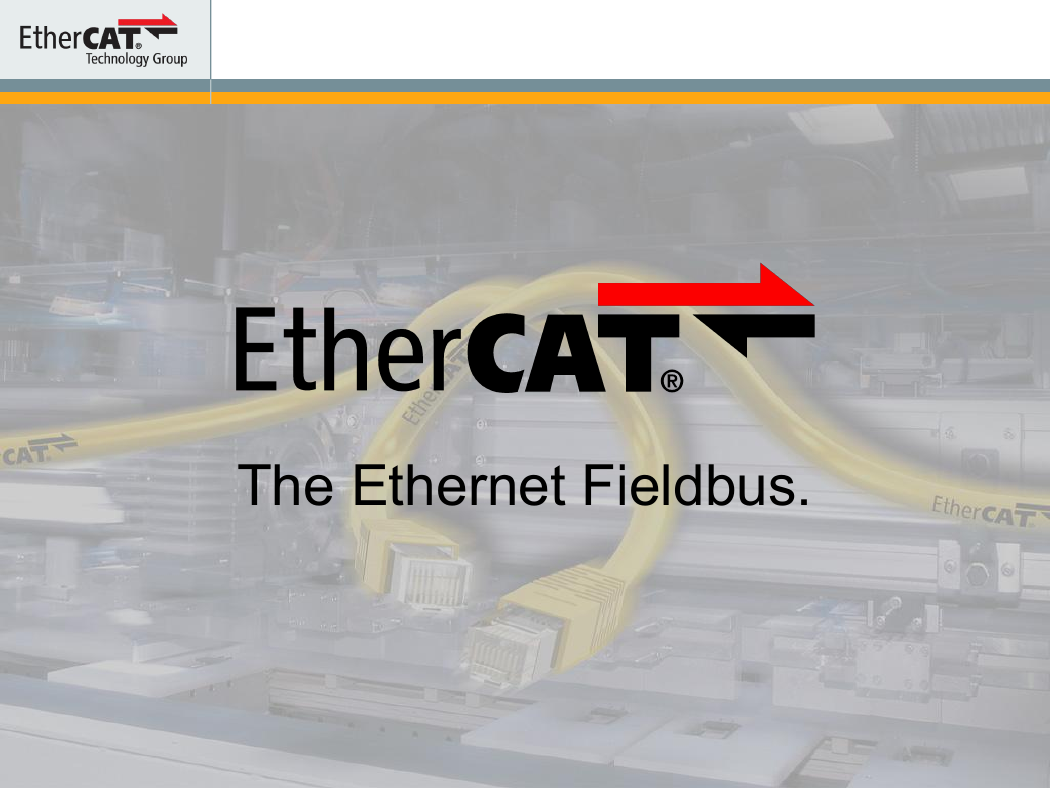
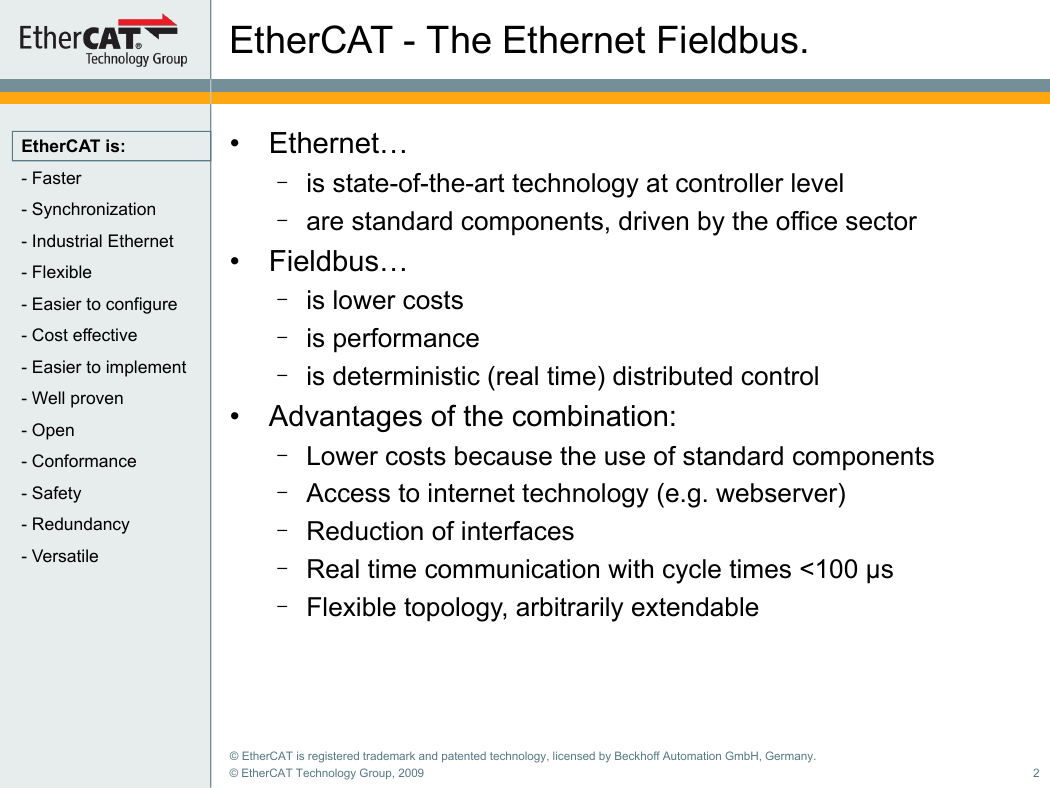
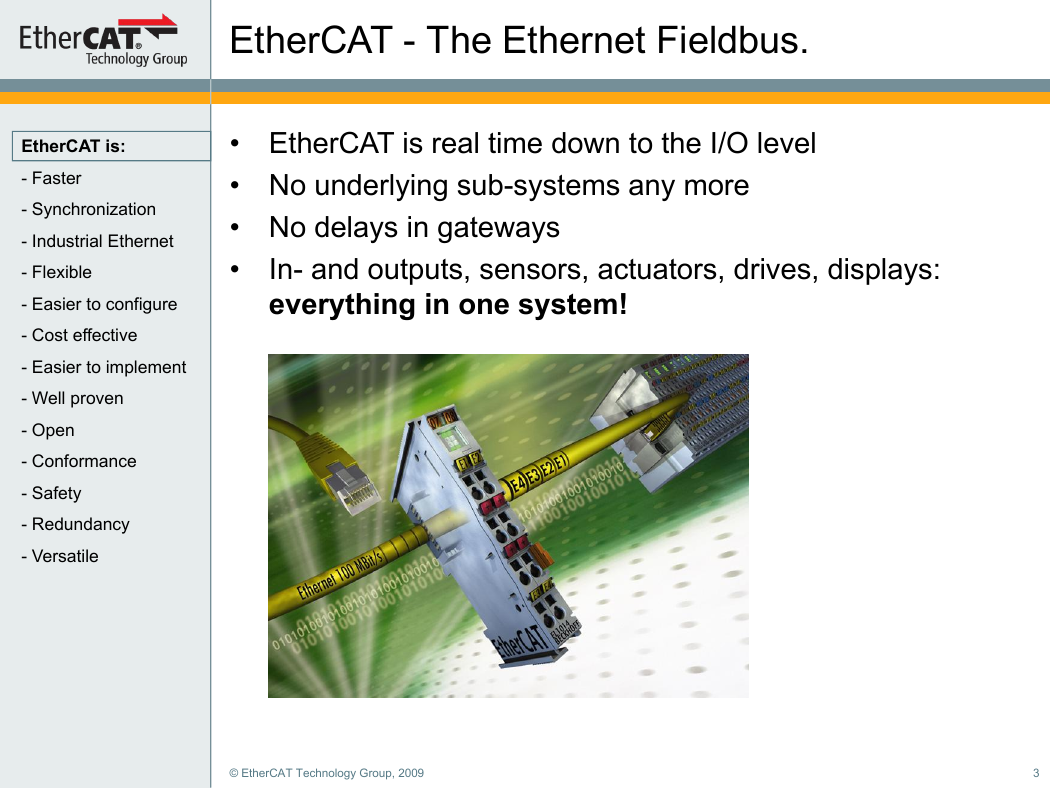
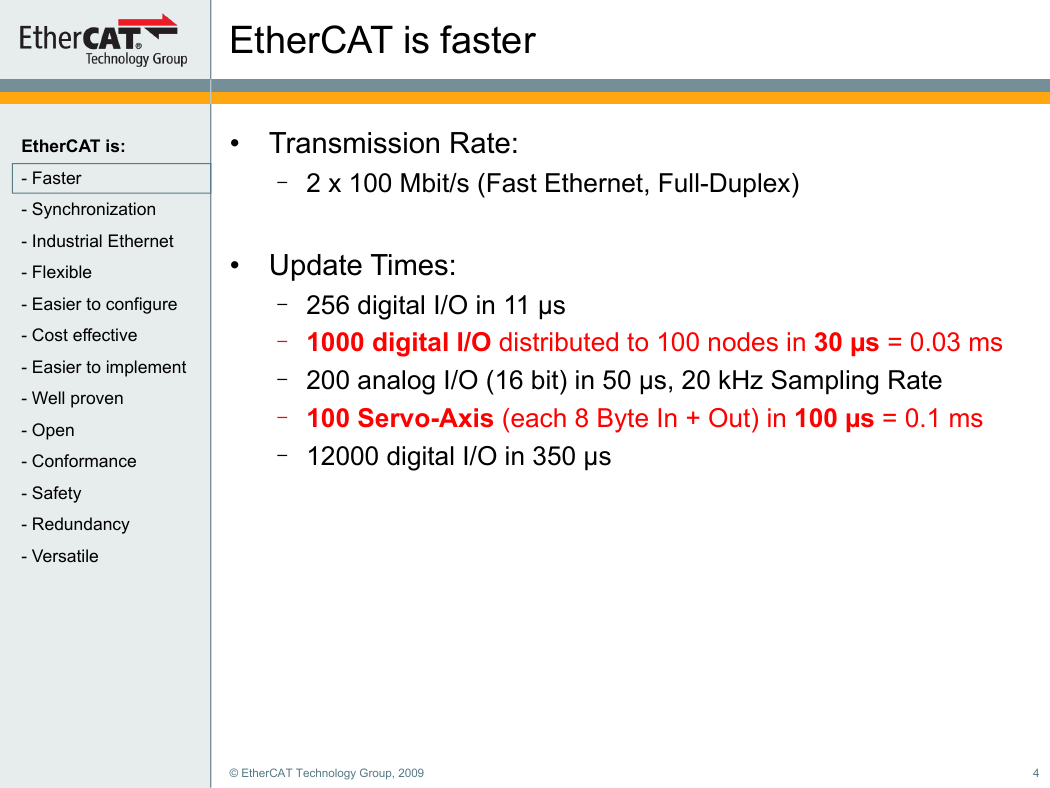
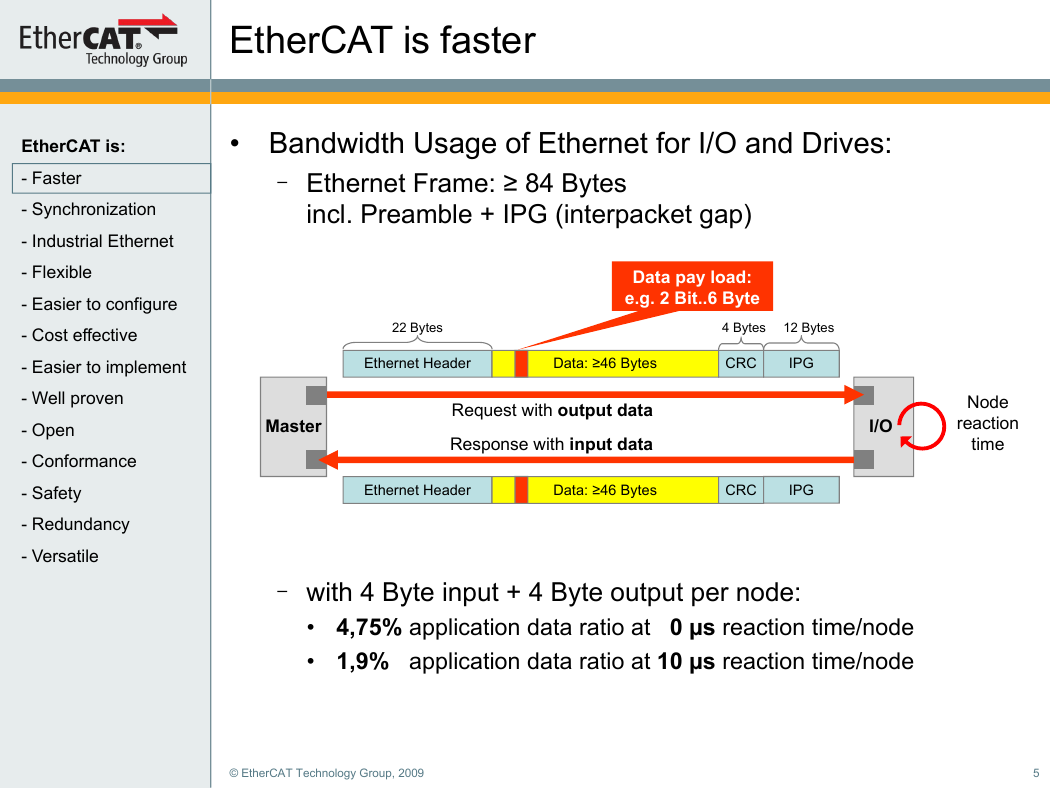

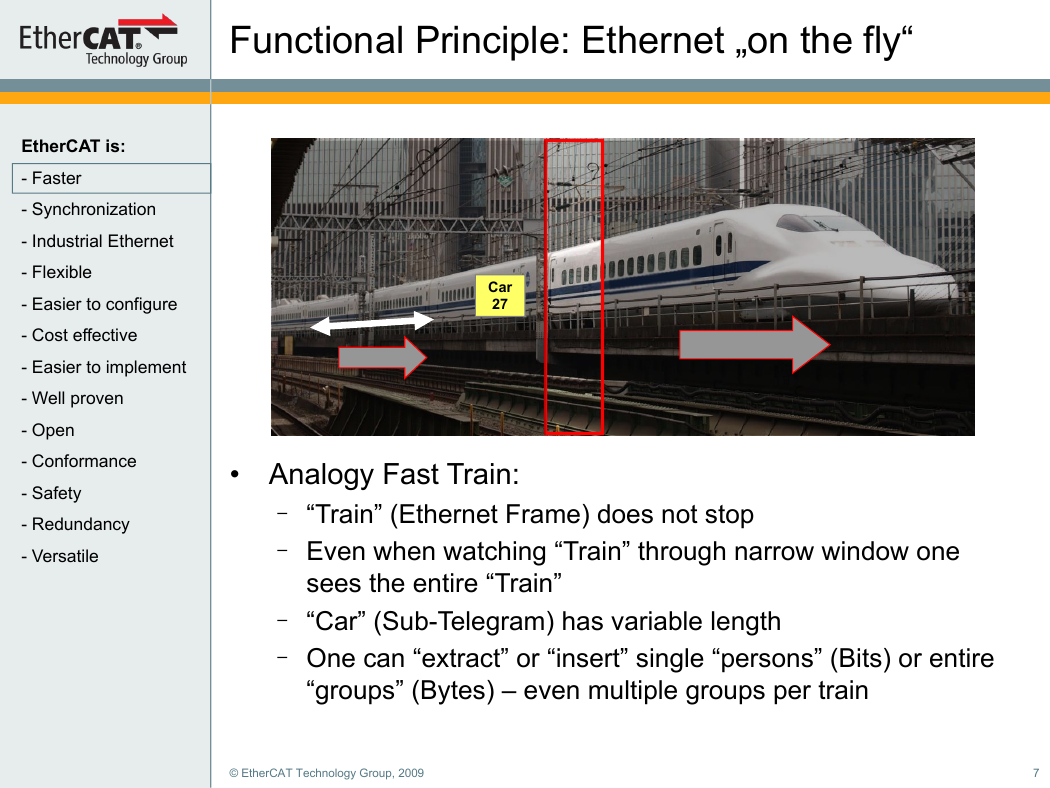
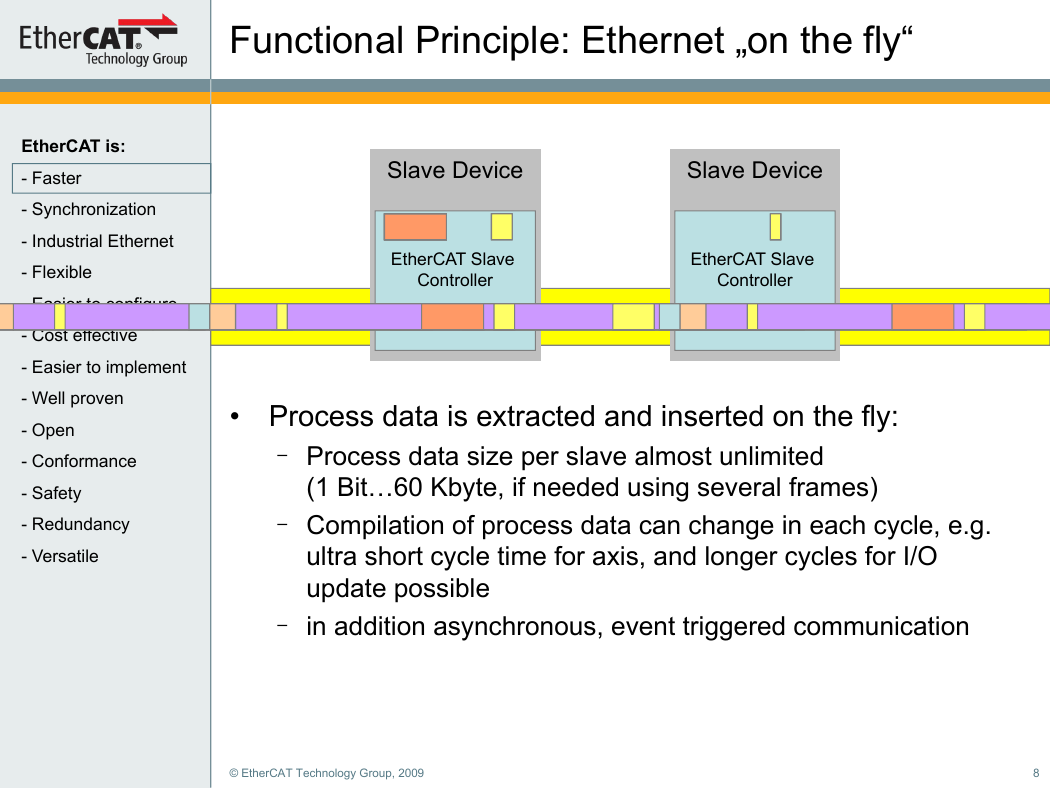








 2023年江西萍乡中考道德与法治真题及答案.doc
2023年江西萍乡中考道德与法治真题及答案.doc 2012年重庆南川中考生物真题及答案.doc
2012年重庆南川中考生物真题及答案.doc 2013年江西师范大学地理学综合及文艺理论基础考研真题.doc
2013年江西师范大学地理学综合及文艺理论基础考研真题.doc 2020年四川甘孜小升初语文真题及答案I卷.doc
2020年四川甘孜小升初语文真题及答案I卷.doc 2020年注册岩土工程师专业基础考试真题及答案.doc
2020年注册岩土工程师专业基础考试真题及答案.doc 2023-2024学年福建省厦门市九年级上学期数学月考试题及答案.doc
2023-2024学年福建省厦门市九年级上学期数学月考试题及答案.doc 2021-2022学年辽宁省沈阳市大东区九年级上学期语文期末试题及答案.doc
2021-2022学年辽宁省沈阳市大东区九年级上学期语文期末试题及答案.doc 2022-2023学年北京东城区初三第一学期物理期末试卷及答案.doc
2022-2023学年北京东城区初三第一学期物理期末试卷及答案.doc 2018上半年江西教师资格初中地理学科知识与教学能力真题及答案.doc
2018上半年江西教师资格初中地理学科知识与教学能力真题及答案.doc 2012年河北国家公务员申论考试真题及答案-省级.doc
2012年河北国家公务员申论考试真题及答案-省级.doc 2020-2021学年江苏省扬州市江都区邵樊片九年级上学期数学第一次质量检测试题及答案.doc
2020-2021学年江苏省扬州市江都区邵樊片九年级上学期数学第一次质量检测试题及答案.doc 2022下半年黑龙江教师资格证中学综合素质真题及答案.doc
2022下半年黑龙江教师资格证中学综合素质真题及答案.doc